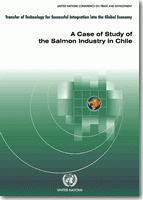
The emergence and the development of the Chilean salmon industry demonstrate the role of technology transfer, and scientific and technological innovation in generation of industries based on natural resource endowment. In this case, the long coastline, abundant freshwater sources and islands, and good climatic conditions are part of Chile´s natural endowments, which, with the appropriate technologies, have played a vital role in the development of the salmon industry.
The Chilean salmon industry exports have increased from about $291 million in 1993 to about $1.4 billion in 2004. Chile´s share in the global production of farmed salmon and trout is estimated to have increased from about 10% in 1990 to about 35% in 2004. More importantly, the poverty index of Chile´s salmon farming region declined from 40% to 13% between 1990 and 2000, while the index of extreme poverty decreased from 24% to 7% over the same period.
These gains are a result of concerted efforts by national and international partners to transfer, adapt, develop and diffuse the technologies needed to farm salmon. The existence of national institutions that help firms acquire and use technology, support emerging firms and encourage the use of technical standards enabled the industry to grow rapidly in Chile. One such institution is Fundación Chile - a non-profit organization - which established three firms that demonstrated the commercial viability of large-scale farming, breeding and production of salmon in Chile.


